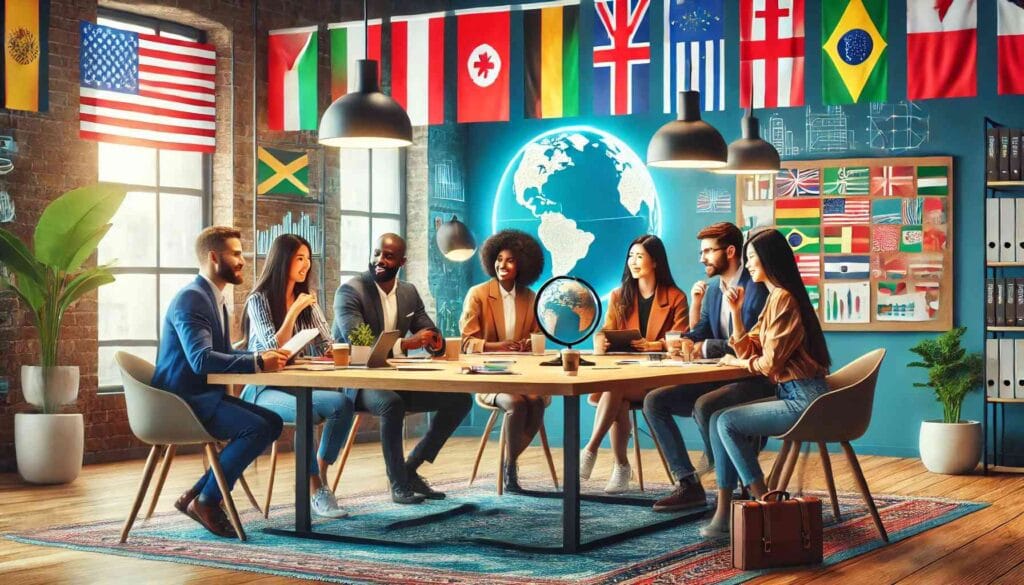How Cross-Cultural Skills Can Foster Success in Today’s Globalized World

In an increasingly interconnected world, the ability to navigate cultural differences has become a critical skill for personal and professional success. Cross-cultural skills, which encompass the ability to communicate, collaborate, and adapt across diverse cultural contexts, are no longer just a “nice-to-have” but a necessity in the globalized landscape. As businesses expand across borders, teams become more diverse, and societies grow more multicultural, individuals who possess strong cross-cultural competencies are better positioned to thrive. This article explores the importance of cross-cultural skills and how they contribute to success in today’s world.
The Globalized World: A Melting Pot of Cultures
Globalization has erased many of the traditional boundaries that once separated nations and cultures. Advances in technology, transportation, and communication have made it easier than ever for people to connect, work, and live across different parts of the world. However, this interconnectedness also brings challenges, as individuals and organizations must navigate cultural differences in values, communication styles, and social norms. In this context, cross-cultural skills act as a bridge, enabling people to build meaningful relationships and collaborate effectively across cultural divides.
Key Cross-Cultural Skills for Success
- Cultural Awareness and Sensitivity: Understanding and respecting cultural differences is the foundation of cross-cultural competence. This involves recognizing one’s own cultural biases and being open to learning about other cultures. Culturally aware individuals are better equipped to avoid misunderstandings and foster mutual respect.
- Effective Communication: Communication styles vary widely across cultures. For example, some cultures value direct communication, while others prefer indirect or nuanced expressions. Cross-cultural skills enable individuals to adapt their communication style to suit different audiences, ensuring clarity and reducing the risk of misinterpretation.
- Adaptability and Flexibility: Success in a globalized world often requires the ability to adapt to new environments and situations. Cross-cultural skills help individuals remain flexible and open-minded when faced with unfamiliar customs, traditions, or ways of thinking.
- Empathy and Emotional Intelligence: Empathy allows individuals to understand and share the feelings of others, even when they come from different cultural backgrounds. Emotional intelligence complements this by helping people manage their own emotions and respond appropriately to the emotions of others.
- Conflict Resolution: Cultural differences can sometimes lead to misunderstandings or conflicts. Cross-cultural skills equip individuals with the tools to address and resolve these issues in a way that respects all parties involved.
The Benefits of Cross-Cultural Skills in the Workplace
In the professional realm, cross-cultural skills are highly valued by employers. Companies with diverse teams often outperform their competitors, as they benefit from a wider range of perspectives and ideas. However, diversity alone is not enough; it must be accompanied by inclusivity and effective cross-cultural collaboration. Employees with strong cross-cultural skills can:
- Build stronger relationships with international clients and partners.
- Enhance team cohesion and productivity in multicultural teams.
- Drive innovation by integrating diverse viewpoints.
- Navigate global markets with greater ease and cultural insight.
For example, a manager who understands the importance of hierarchy in certain cultures may approach decision-making differently when working with teams from those backgrounds. Similarly, a salesperson who is aware of cultural preferences and taboos can tailor their pitch to resonate with clients from different regions.
Cross-Cultural Skills in Everyday Life
Beyond the workplace, cross-cultural skills enrich personal lives by fostering deeper connections with people from different backgrounds. In multicultural societies, these skills help individuals navigate social interactions, build friendships, and contribute to inclusive communities. They also promote global citizenship, encouraging people to appreciate and celebrate cultural diversity rather than fear or reject it.
Developing Cross-Cultural Skills
Fortunately, cross-cultural skills can be developed and refined over time. Here are some strategies to enhance these competencies:
- Educate Yourself: Learn about different cultures through books, documentaries, and online resources. Understanding cultural histories, traditions, and values can provide valuable insights.
- Travel and Immerse Yourself: Experiencing different cultures firsthand is one of the most effective ways to build cross-cultural skills. Traveling, studying abroad, or participating in cultural exchange programs can broaden your perspective.
- Engage in Cross-Cultural Interactions: Seek out opportunities to interact with people from different cultural backgrounds. This could involve joining multicultural organizations, attending cultural events, or simply striking up conversations with individuals from diverse communities.
- Practice Active Listening: When engaging with people from other cultures, listen attentively and ask questions to clarify your understanding. Avoid making assumptions based on stereotypes.
- Reflect on Your Experiences: After cross-cultural interactions, take time to reflect on what you learned and how you can improve. Self-awareness is key to developing cross-cultural competence.
Conclusion
In a world where cultural boundaries are increasingly blurred, cross-cultural skills have emerged as a vital tool for success. Whether in the workplace, in social settings, or on a global stage, these skills enable individuals to connect, collaborate, and thrive in diverse environments. By cultivating cultural awareness, effective communication, adaptability, empathy, and conflict resolution, individuals can unlock new opportunities and contribute to a more inclusive and harmonious world. As globalization continues to shape our lives, the importance of cross-cultural skills will only grow, making them an indispensable asset for the future.
Source : Medium.com




